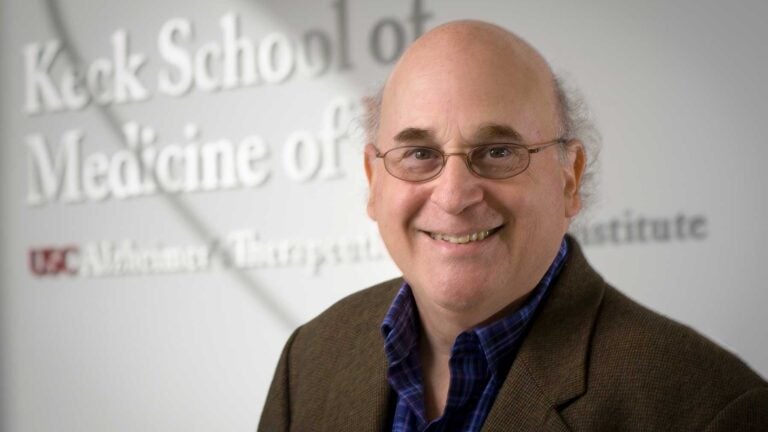
Paul Aisen (USC Photo/Gus Ruelas)
Paul Aisen Aims to Find and Treat Alzheimer’s Early
The USC Alzheimer’s Therapeutic Institute director leads the fight to end a disease that affects millions.
Ask a friend, a coworker or a parent at your child’s school whether they’ve known someone with Alzheimer’s disease. Chances are good that everyone will nod yes. They’ll also all probably know that there’s nothing that can cure it.
At least not yet.
Leading Alzheimer’s researcher Paul S. Aisen aims to change that. He joined USC in 2015 to direct the San Diego-based USC Alzheimer’s Therapeutic Research Institute, or ATRI, the largest academic program in the world working on therapeutic trials against the disease. The Keck School of Medicine of USC rheumatologist spoke to USC Trojan Family Magazine about why he’s more optimistic than ever that better treatments lie ahead.
How have your research efforts been going since joining USC?
The complex work we do requires collaboration from many different institutions, companies and international organizations. It requires administrative support that is unusual in an academic institution. USC basically removed all the barriers that once slowed down our work and has created the environment we’ve always wanted for our Alzheimer’s research.
Some of the important new programs we’ve developed here include building an entirely new online infrastructure for testing Alzheimer’s therapies at an early stage. Additionally, we’ve created a new multicenter trial focused on preventing memory loss in an at-risk population and started the latest iteration of international collaboration for research on Alzheimer’s disease biomarkers.
What do you hope to achieve in Alzheimer’s research?
USC ATRI is establishing the framework for early intervention against the disease by describing the phase of the disease before symptoms arise in a way that allows for drug development and regulatory approval. This was never possible before because there was no such thing as an early stage of Alzheimer’s disease.
Our No. 1 goal is to develop effective treatment that slows or even halts its progression at its earliest symptomatic stage. Our early intervention trial framework should be applied to as many promising trials as appropriate.
Many of our ongoing studies lay the foundation for change, and we anticipate major Alzheimer’s therapeutic advances even within the next three years, but certainly in the next ?ve to 10 years.
What kinds of strategies do you expect to test?
A buildup in the brain of a protein called amyloid is a hallmark of Alzheimer’s disease, and we believe that ?ghting amyloid is critical. We intend to launch a global study attempting to reduce amyloid plaques in at-risk populations and a trial approaching anti-amyloid therapy in a new way among patients with early-stage Alzheimer’s. We also want to study new tools to prevent early-onset Alzheimer’s that’s inherited from parents.
